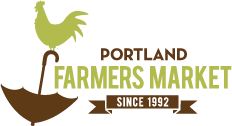Food Front Cooperative Grocery
Beyond Food, To Community
Scan the shelves and produce section at Food Front and you’ll notice a surprising number of locally grown or made products—from chips to cherries, from popsicles to parsnips. This happens to be one of Food Front’s missions—to connect with local farmers and food purveyors and to source their fruits and vegetables and products. A match made in grocery heaven.
With this ethos in place, it would make sense then for Food Front to sponsor the Thursday NW 23rd Portland Farmers Market around the corner from their NW Thurman store. Or not? To some, this might seem like a strange alliance. But Valerie Kasinskas, assistant manager for community outreach, laughed and said “Thursdays are our busiest nights at the store! We see owners that are happy to know that we’re sponsors and we see new shoppers who come from the farmers market into the store to supplement their purchases.”
Founded by a group of NW Portland neighbors in 1972, Food Front has been a fixture in the food community, running a successful community-owned grocery store. This September they celebrate the second anniversary of their Hillsdale store, which, according to Valerie, has been a big success. “It’s really exciting. The store has its own feel and flavor and really reflects the surrounding community.” In just the last year 1,000 new members have come on board, bringing their total to 6,600.
All shoppers are welcome at Food Front. But it is these owners who provide the capital—and common ideals—to allow a business like this not only to exist but also to flourish. Historically, co-ops have allowed people to use their power in numbers to source food products unavailable in mainstream grocery stores, from producers with shared values, and who use eco-friendly packaging.
Today, many mainstream stores who have adopted this natural/local/organic purchasing model might owe their success to co-ops.
To fulfill its commitment to the community, Food Front has forged relationships with an impressive list of local farmers and food producers. These relationships allow them to bring the freshest, highest quality items to their customers. Labels on produce not only say “local” or “organic” but include names of some 40 to 50 farms on which the produce is grown. This fulfills another key mission of the store—education—encouraging people to be more aware of their food sources.
The store’s modest size and nimble structure gives them the flexibility to test products, to buy interesting items in smaller quantities, to respond to customer requests, and to mentor food producers who want to introduce their barbecue sauce or cookies to the world. Each semester, grocery manager Gary Koppen visits OSU’s Food Innovation Center to help program participants learn how to get their products to the retail marketplace. “Food Front is often the first store where local producers get their start. We seek out these products, and these food entrepreneurs know that there’s no barrier to entry here,” says Tom Mattox, marketing and outreach director. Indeed, many successful products now sold nationally got their start at Food Front.
In this competitive market even grocery stores must continue to enhance their offerings. One such improvement was adding a meat counter to the Hillsdale store, allowing them to deliver freshly cut, locally sourced meat to the NW location every day. And as an expression of their education mission, Food Front has also been screening documentaries in coordination with the NW Thurman public library—showing films like Food, Inc., Fresh, Black Gold and The Price of Sugar the second Wednesday of every month. Join the Food Front mailing list for updates on this and other happenings. Coming up is The Future of Food on September 8.
Food Front values being part of an education process that connects farmers to consumers, spreads good will around and helps create relationships and community. People who shop at the co-op care about what they buy. As Tom put it, “There’s a higher consciousness in Portland about food than anywhere else I’ve been.”
Becoming a member
The one-time investment —called a share—is $150. As an investment in the store and its mission, an owner can also take back their share, as the result of a move. Ownership privileges start immediately, whether one pays the fee in full or stretches it out over time, through $5 monthly payments. The tangible privileges to owning a share are many: access to dozens of regularly discounted items, special discounts days four times a year, dividends from profits, and the ability to vote for the board members who set goals and make strategic decisions for the store. But for many, a powerful, if subtle, benefit is the knowledge that they are helping to create and sustain a business that aligns with their values. As Valerie said, “People support the store because it’s about not being a passive consumer. We’ve even got an owner in Miami!”

